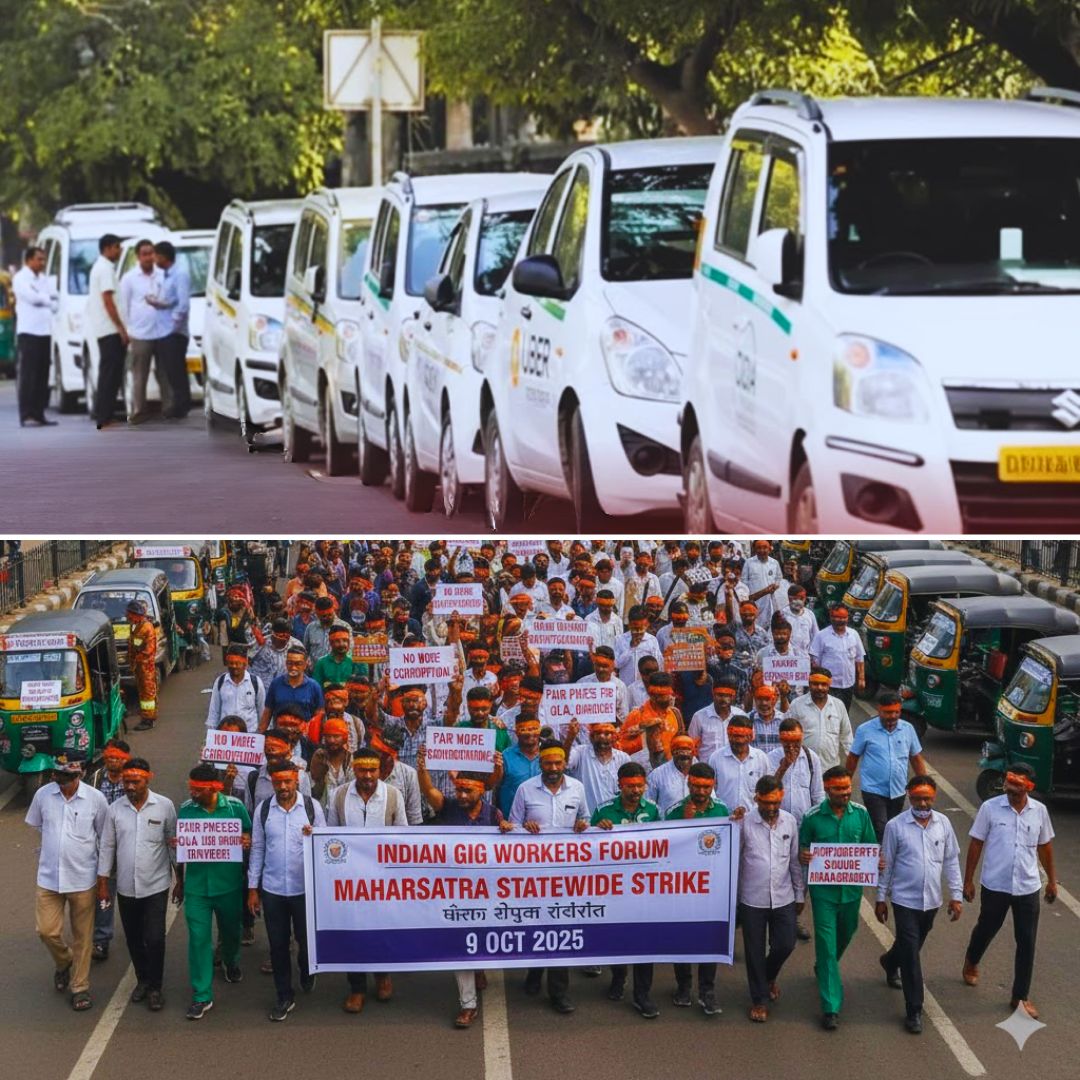The Indian Gig Workers Forum has announced a statewide strike on Thursday, 9 October 2025, calling on rickshaw, taxi, and cab drivers across Maharashtra to suspend their services.
The strike protests alleged corruption and arbitrary management by the Transport Department concerning app-based transport aggregators Ola, Uber, and Rapido. This significant mobilisation sheds light on the growing unrest in India’s gig economy and the complex challenges faced by app-driven drivers.
Organised Strike Against Arbitrary Management
The Indian Gig Workers Forum, representing thousands of drivers, has united under the call for a one-day strike to protest what it terms the “illegal and arbitrary” management of ride-hailing apps by the Transport Department. Dr. Keshav Nana Kshirsagar, Forum President, has alleged that the department has ignored the widespread violations by Ola, Uber, and Rapido, including the usage of private two-wheelers for passenger rides and frequent fare cap breaches.
Despite multiple FIRs registered by drivers against these companies, the Forum accuses senior officials, including the Transport Minister, of collusion with the platforms, purportedly accepting sponsorships and turning a blind eye to violations. Drivers have long complained of unpredictable fare structures, heavy commissions, and a lack of welfare support from the companies.
The statewide strike aims to pressure the government into taking stronger regulatory actions and addressing these longstanding grievances.
Sustained Protests and Growing Driver Discontent
This strike follows months of escalating protests by gig workers across Maharashtra. Since mid-July, drivers have staged numerous demonstrations at Azad Maidan in Mumbai, ranging from hunger strikes to shutdowns, demanding transparency and stricter enforcement of transport regulations.
The agitation escalated to a “Jail Bharo” campaign on 30 September, during which hundreds of drivers courted arrest after government officials declined to hold substantive talks. Though a follow-up meeting was scheduled with the Secretary to the Chief Minister, the Forum claims that the Transport Department has ignored recommendations and delayed meaningful dialogue.
Drivers report suffering financially under current app policies, with losses caused by fare manipulation and payment inconsistencies. The Forum’s call to strike statewide reflects mounting frustration, amplified by perceived government inaction and lax regulation of platforms that dominate urban mobility.
Impact on Commuters and the Transport Ecosystem
Maharashtra’s commuters should prepare for significant travel disruptions on October 9, as thousands of rickshaw, taxi, and cab drivers affiliated with the Forum are expected to halt services. Past strikes in Mumbai and Pune caused widespread inconvenience, leading to longer wait times, overcrowding of remaining transport modes, and heightened commuter anxiety.
The strike’s timing coincides with a major national financial conference in Mumbai, underscoring drivers’ intent to elevate their concerns to the highest levels of government. Meanwhile, Transport Department officials have appealed for calm, insisting that policy decisions comply with the law and that the department remains open to dialogue, albeit within legal limits.
Nevertheless, the drivers’ grievances reflect broader tensions fueled by rapid digital transformation and gaps in labour protections for gig workers.
Historical Context of Gig Worker Struggles
India’s gig economy has expanded rapidly over the past decade, enabling flexible earning opportunities but also exposing workers to precarious conditions. App-based transport services revolutionised how millions commute but also introduced uncertainty around remuneration, social security, and representation.
Driver protests have been a common feature in many cities, including Mumbai, Bengaluru, and Pune, where demands for fare transparency, welfare schemes, and regulatory clarity remain unmet. The Maharashtra strike follows a string of warnings and protests across India, signalling an urgent need for updated labour laws and frameworks tailored to the gig economy.
The ongoing conflict showcases the challenge of balancing innovation and worker welfare in a digitally driven marketplace.
The Logical Indian’s Perspective
At The Logical Indian, there is a firm belief that gig economy progress must not come at the cost of workers’ security and dignity. While app-based services have modernised transport systems and created millions of jobs, the underlying labour rights of drivers demand recognition.
Governments, companies, and unions must engage in sustained, transparent dialogue to develop policies that protect gig workers from exploitation while ensuring service quality for commuters. The current strike highlights the consequences of regulatory neglect and the necessity for fair wages, social protections, and ethical industry practices. Our society benefits when workers are valued and heard.












